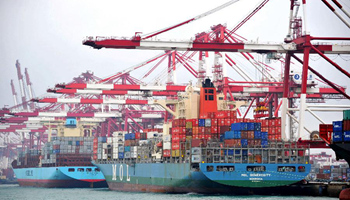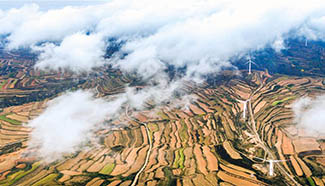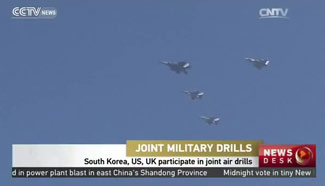XI'AN, Nov. 8 (Xinhua) -- Feng Xiaoyan views herself as a "new farmer" despite being 53 years old.
Feng has a contract to plant organic potatoes in 20,000 mu (1,333 hectares) of sandy land in her hometown in northwest China's Shaanxi Province, and established her own brand "Sister Potato" in 2009.
"I'm not young, but I have 'Internet thinking' like many young people," Feng said at the ongoing 2016 China Yangling Agricultural Hi-Tech Fair in Yangling District, a high-tech agricultural zone in Xianyang City, 70 km west of Xi'an, capital of Shaanxi.
China's food safety has been questioned due to the overuse of pesticides, fertilizers and chemical additives. Feng, seeing a chance for the transformation of Chinese agriculture, has decided to plant eco-friendly potatoes to international standards.
To cater to different demands from various consumers, Feng chose different potato breeds. "Potatoes are different. Some are good for chips while others are good for mash," she said.
In her eyes, new farmers are those who have knowledge, capital and marketing experience, as well as land.
Feng was a teacher for eight years in her hometown Zizhou County in the city of Yulin before she worked as a government official in the city of Tongchuan from 1990 to 1994.
Feng said the high quality of the potatoes is the major reason for her success. From the very beginning, she brought in the best potato varieties in the world and employed potato experts from home and abroad to ensure the use of the most sophisticated planting techniques.
Feng also takes advantage of social media to promote her products. "Your fans and followers can bring profits to you," Feng said.
Feng told Xinhua she refused to use social media at first. "I did not realize microblogs could bring so many fans and orders within just two weeks," she said. "Using microblogs as a free advertizing platform helps us attract more customers."
For new farmers, it is vital to establish their own brands and win customers' trust, Feng said.
A Ministry of Agriculture report shows that China has roughly 2 million new farmers who run farm product businesses on popular online platforms such as Taobao, Weibo and Wechat.
Compared with traditional farmers, they are generally well-educated. Some even have an overseas education.
Wang Xiaotie, a graduate from the Northwest Agriculture and Forestry University, is one such new farmer.
In 2012, he gave up his job as the general manager of a vegetable export company in Beijing and went back to Yangling, a testing ground for new agriculture technology.
"Organic agriculture and circular agriculture are not new terms, but are inherited from the wisdom of our ancestors. We only have to observe the laws of nature to plant high-quality fruit," Wang said.
Wang has a kiwi-fruit orchard covering 500 mu in Yangling. To ensure that all his kiwi-fruits are organic, Wang built railings around the orchard to separate it from surrounding farmland.
"We use organic fertilizer -- cow dung and sheep manure -- from Inner Mongolia in our orchard," Wang said.
In October, his kiwi fruit won organic certification from the United States, the European Union, Japan and China.
"Returning from a big city to the town, I am quite aware of the demands of urban people and the market," Wang said. "They are concerned about food safety. It is our hope to provide safe agricultural produce for consumers."
Du Zhixiong, a research fellow with the Chinese Academy of Social Sciences, is not sure if all produce from the new farmers is up to the standards of "organic produce," but speaks highly of the ambition of such farmers.
"Organic produce has become a symbol and an aim of Chinese new farmers," he said. "In this sense, they are contributing to the country's food safety."










